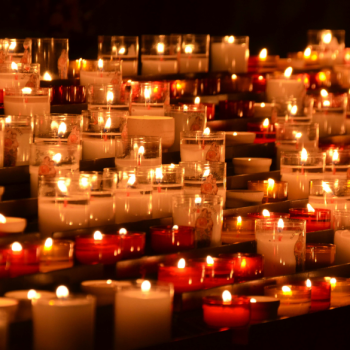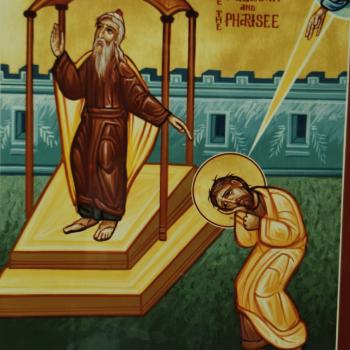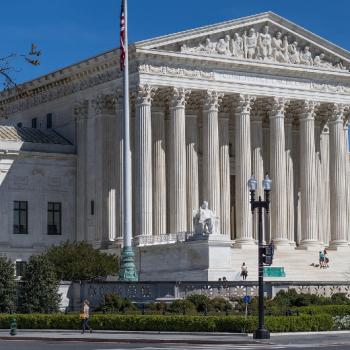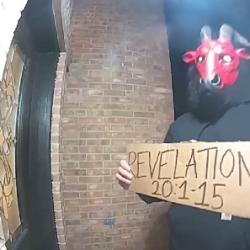An Interview with Sarah Colt
By Patheos staff
 Before the debut of the landmark PBS series, God in America, Patheos sat down with some of the key figures involved in the series. In this interview, producer Sarah Colt discusses America's Christian identity, reenacting a secret religious meeting among slaves, and the difficulty of casting Abraham Lincoln's character. Colt is an Emmy Award-winning documentary filmmaker who most recently wrote, directed, and produced The Polio Crusade, which aired in 2009 on PBS's American Experience, and "Geronimo," which aired as part of American Experience's 2009 landmark Native American history series We Shall Remain.
Before the debut of the landmark PBS series, God in America, Patheos sat down with some of the key figures involved in the series. In this interview, producer Sarah Colt discusses America's Christian identity, reenacting a secret religious meeting among slaves, and the difficulty of casting Abraham Lincoln's character. Colt is an Emmy Award-winning documentary filmmaker who most recently wrote, directed, and produced The Polio Crusade, which aired in 2009 on PBS's American Experience, and "Geronimo," which aired as part of American Experience's 2009 landmark Native American history series We Shall Remain.
The approach you and your colleagues have taken with this film combines historical dramatizations and scholarly interviews with a light background narrative that helps drive the story forward. Why take this particular approach?
The departure for this series, as least in terms of my previous work in historical documentary filmmaking, was the fact that rather than doing what has become the standard style for historical documentaries -- the reenactment -- we decided to cast actors to play these historical characters. So the important aspect was not that the room was historically exactly accurate (Lincoln's Oval Office, or wherever the scene was situated), but rather that we cast someone who could embody this historical character, whether it's Lincoln or Frederick Douglass, someone who would be able to bring the written material to life in an emotional way (and all of the material is based on the characters' actual writings).
That stylistic choice started early on, with the executive producer, Mike Sullivan. He hired David Belton, who had done an amazing film about Van Gogh where he had cast an actor to play Van Gogh, so David brought that idea to the series. There was a lot of apprehension from the executives about casting Lincoln, but we pushed forward and pushed them into believing we could do it.
In terms of the style of the series, that, for me, was the biggest change in comparison to standard historical films.
How did the group dynamics work? How did you negotiate the process as a team, given the difficult decisions of making this film -- what to cover, what to leave out?
I came on board a couple of months after David Belton had started (David moved over from England). We inherited the treatment for the series, which had been written by Marilyn Mellowes. That treatment was both to help us understand what the film was going to be, as well as for raising money.
So we had that treatment, which was very detailed and really laid out the history, but it wasn't a script. It wasn't television yet -- it was more of a written document that had to be transformed into three separate nights. So my task was Night #2. David Belton had already been wrestling with the material for several months [when I started]. I worked very closely with him. We did a lot of batting around of ideas, and then I wrote what we call a pre-shooting script, which looks more like what a television show or film is going to look like.
So I worked with David and Marilyn and Mike Sullivan on that -- we all talked about it, and once I had done a second draft of that, I started shooting. So there's a pretty extensive scripting phase with a film like this, before you start shooting. It's a very collaborative work.
You tell fascinating stories about individuals -- Frederick Douglass, Abraham Lincoln, and others -- and these stories shed light on larger central themes of the role religion has played in American history. Tell us more about the story you want tell.
I think the larger story of this series is really about American identity -- how did we come to where we are today? For each film [in the three-part series], that's really at the heart of what was included.
The larger theme we were always coming back to was, How has religion shaped and been integral to the American story? For my two hours, the plan was to do a film about how religion was a part of the Civil War. If you're talking about American identity, you can't ignore the Civil War, and yet, for scholars of religion, the Civil War isn't considered a particularly interesting theological moment; it's often not really considered a central part of religious history.




